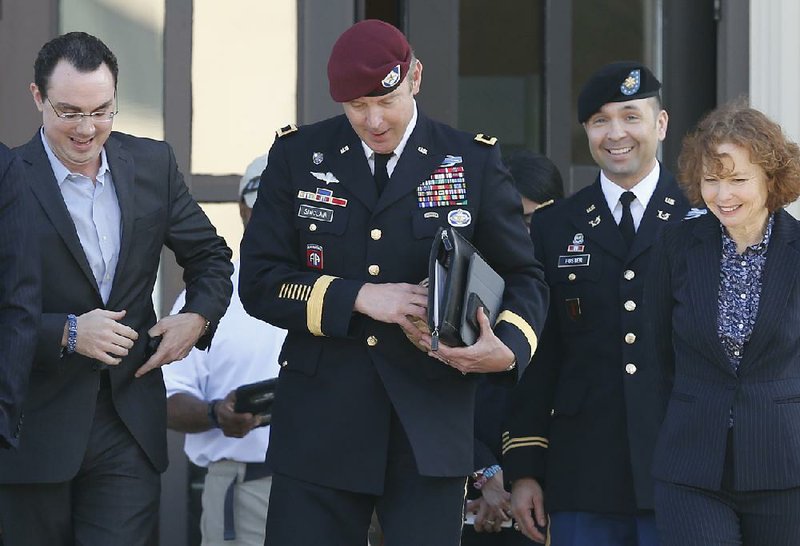FORT BRAGG, N.C. - Ending a closely watched sexual-misconduct trial, a judge Thursday reprimanded Brig. Gen. Jeffrey Sinclair for mistreating an Army captain who was his mistress, among other offenses, but did not sentence him to jail time and allowed him to remain in the military.
Sinclair also was ordered to forfeit $5,000 a month in pay for four months but will be allowed to keep his pension and other benefits.
The decision by the judge, Col. James Pohl, was a sweeping victory for the defense: A plea agreement reached by Sinclair’s lawyers and military prosecutors earlier this week called for capping prison time at 18 months and did not ensure that he could keep his pension.
Sinclair, 51, hugged his lawyers after the judge made his ruling from the bench. The general said little as he left the courthouse, describing the past two years as “a very difficult time for me and my family.”
“The system worked,” he said, adding that he was going to go “hug my kids and see my wife.”
The sentence was far less than what the general faced when the case began two years ago: a possible life sentence and registration as a sex offender if he was convicted on charges that he sexually assaulted the captain, 34, who had been his lover for three years.
Critics of the way the Pentagon handles sexual-assault cases said Sinclair should have received a tougher sentence.
“This is another sordid example of how truly broken the military justice system is,” Rep. Jackie Speier, D-Calif., said in a statement. “This sentence is a mockery of military justice, a slap on the wrist nowhere close to being proportional to Sinclair’s offenses.”
The sentencing concluded a case that was viewed by many as embodying rampant sexual misconduct in the military, even at senior ranks, and it fueled demands by Congress that the Pentagon crack down on the problem.
But the prosecution’s case started coming apart after military lawyers concluded that their chief witness, the captain, may have lied at a hearing in January. It collapsed last week when Pohl found that political considerations may have improperly influenced the prosecution.
As a result of that finding, defense lawyers and prosecutors reached a plea agreement this week in which Sinclair pleaded guilty to lesser offenses in exchange for dismissal of the sexual-assault charges. In addition to admitting to mistreating his mistress, he pleaded guilty to soliciting explicit pictures from female officers, disobeying a commander, possessing pornography in a combat zone, misusing his government credit card, and adultery, which is a crime in the military.
Although the judge allowed Sinclair to remain in the military and denied prosecutors’ requests to dismiss him from the service - an action that would have stripped him of his military pension - his chief defense lawyer, Richard Scheff, said after the sentencing that the general “will be putting in his retirement papers.” He is likely to retire as a lieutenant colonel, the last rank he held before the misconduct covered in his guilty pleas took place.
From the start, the case was a public-relations disaster for the Army, and over time it became a legal nightmare for the prosecution.
In his ruling opening the door to Sinclair’s plea deal, Pohl suggested that commanders deciding how to proceed in the Sinclair prosecution might have been overly concerned about political criticism.
Front Section, Pages 4 on 03/21/2014

